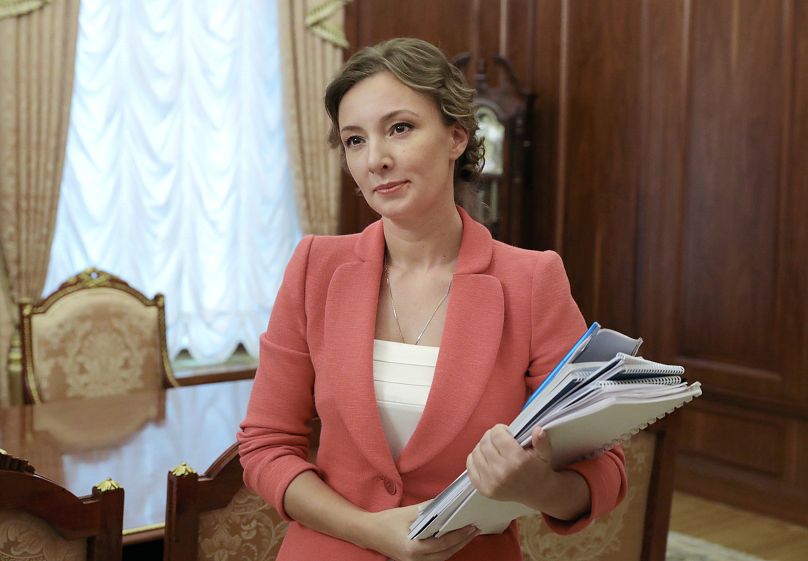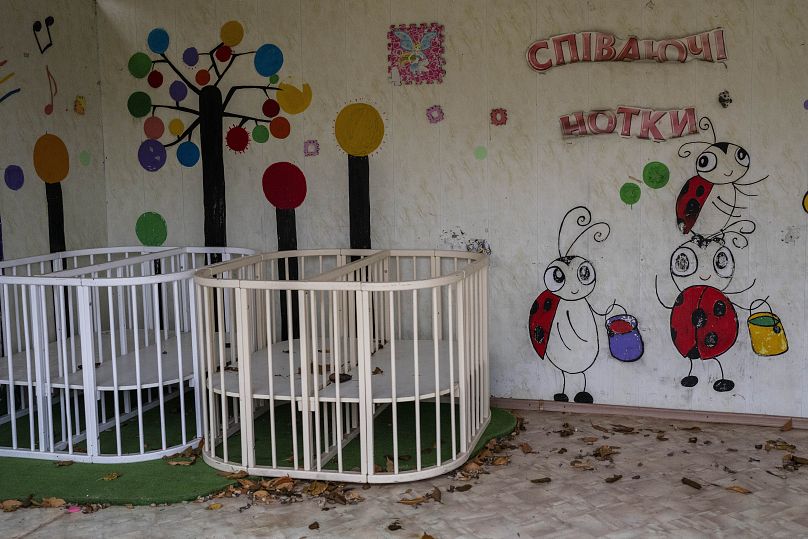Open-source data investigations and social media channels like Telegram are playing a key role in spreading awareness not only about Maria Lvova-Belova, but a bigger structure of re-education camps, transport routes, deportation strategies and the network deporting Ukrainian children to Russia.
Maria Lvova-Belova has become the face of a pervasive scheme with the Kremlin at its head: the deportation of thousands of Ukrainian children to Russia in what Moscow portrays as a humanitarian mission and the International Criminal Court calls potential war crimes.
 ADVERTISEMENT
ADVERTISEMENT
 ADVERTISEMENT
ADVERTISEMENT
Open-source data and channels like Telegram are shedding light on Lvova-Belova and an operational structure composed of re-education camps, transport routes and deportation strategies. Organisations are working to pull back the curtain on the network behind it.
“It’s really important to understand that a lot of people from the Russian government are managing this,” Artem Starosiek, CEO of Molfar, a Ukrainian open-source intelligence community that investigated Lvova-Belova, said.
The network follows a top-down hierarchy.
Orders flow down from Putin through Lvova-Belova and the heads of occupied territory, according to Karolina Hird, Russia Analyst at the Institute of the Study of War. Local public officials, hospital workers, journalists, university staff and military members have been implicated in reports and firsthand accounts. Others organise transportation logistics, fill out paperwork and issue passports.
‘She talks about receiving a prophecy from a priest as a young girl’
Maria Lvova-Belova was appointed as the Presidential Commissioner for Children’s Rights in 2021.
“This means that she is Kremlin-appointed, Putin-appointed,” Hird said. “That’s how this position is staffed.”
She was born in Penza, a city southeast of Moscow, in 1984. In the early 2000s she worked as a children’s guitar teacher. She was determined to raise a big, religious family from an early age, according to Tetiana Fedosiuk, Editor and Analyst at the International Centre for Defence and Security.
“She talks about receiving a prophecy from a priest as a young girl that she would be the wife of a priest,” Fedosiuk said. “That’s her curated story.”
Lvova-Belova married Pavel Kogelman, now a Russian Orthodox priest. She has at least ten children, biological and adopted—including a teenage boy from Mariupol that she took custody of this summer—and has fostered at least another ten.
“There has definitely been a trend over the last few administrations to choose younger women with children who present as very maternal to take up this political position,” Hird said. “Her predecessor [Anna Kuznetsova] is from the same region and is the same age cohort.”
Lvova-Belova co-founded Blagovest, an organisation supporting orphans, with Kuznetsova. She launched several facilities for orphans and disabled people including the Louis Quarter, a NGO named after Louis Armstrong that acted as a middle ground between state homes and independent living. But according to Fedosiuk, although the initiatives were good in theory and may have genuinely benefited people, local reports flagged corruption in a murky scheme involving bank loans for treatment costs.
“The way she tells the story, she didn’t need any money… her husband was a successful IT person caring for her family, and being a person of God, everything just fell into place,” Fedosiuk said. “Whatever door she knocked on, everyone of course gave her the money.”
‘She has met and works very closely with the four occupation heads’
Lvova-Belova’s role is partly domestic, addressing social services for Russian orphans and single mothers, according to Hird. On the international side, she speaks frequently about the removal of children from Ukraine, framed as a humanitarian mission. Some children are separated from their families in filtration camps, others are moved en masse from institutionalised care. Sometimes, medical and university workers are involved.
“In her Ukraine-facing role… she has met and works very closely with the four occupation heads … to consult them on children’s issues and determining which vulnerable children need to be removed to Russia,” Hird said.
The occupation heads are Yevgeny Balitsky, Denis Pushilin, Leonid Pasechnik and Vladimir Saldo (from Zaporizhzhia, Donetsk, Luhansk and Kherson).
Ramzan Kadyrov of Chechnya runs a sort of sub-scheme bringing over teenage boys for military patriotic education, according to Hird.
“They’re taught how to handle firearms, they’re given the Russified version of Chechen history and Russian history, and are basically placed through very vigorous social programming and indoctrination,” she said.
Other children are sent to re-education camps. In occupied territories, school curricula have been changed to Russian.
A report by Yale University and the US State Department Conflict Observatory programme identifies Russia’s Commissioner for Human Rights Tatyana Moskalkova as an important player in the programmes for re-education camps. Sergey Kravtsov, the Minister of Education, supervises the updated curricula in occupied territories.
‘The military is responsible to some degree’
The network extends to “local commissioners for children’s rights, education departments, health departments and the military officials in occupied territories involved in filtration camps and transport routes,” Fedosiuk explained.
There are different ways that children are physically brought into Russia, some of which indicate military involvement.
“Lvova-Belova herself has independently commissioned the transportation of children, though we also know that children have arrived in Crimea by train,” Hird said. “We do assess that the military is responsible to some degree of transporting the children or facilitating or protecting the transport of children.”
Molfar suggests Vasily Vasin, the former head of the Donbas bus drivers’ union, could be the head of transportation from Donetsk.
‘There are thousands of people who need to be held accountable’
Molfar identified the Republican Clinical Tuberculosis Hospital, Vyshnevsky Hospital, Novoazovsk Hospital and others as some of the places where children are likely being held in Donetsk.
“Even the medical institutions are involved, because that’s how some children are deported from Ukraine… The Russian doctors sign paperwork to say that they need treatment, and that’s how they’re transported, [under the guise of] medical evacuation,” Fedosiuk said.
Molfar also flagged Yulia Martovalieva, a journalist from Russia Today, for personally moving 20 children from Mariupol to Donetsk.
The Russian Red Cross is listed as a partner of ‘Into the Hands of Children’ campaign headed by Lvova-Belova. Molfar lists Gulfstream, Geography of Good and LizaAlert as other partners.
“There are so many people involved,” Fedosiuk said. “There are people doing paperwork, issuing passports, dealing with the transportation logistics… there are thousands of people who need to be held accountable to some degree.”












